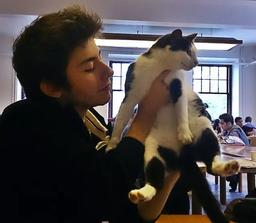The verbs yemek and demek change the e in their stem to an i when followed by a y:
| English | First form | Second form | Third form |
|---|---|---|---|
| Eat. | Ye. | Yiyin. | Yiyiniz. |
| Say hello. | Merhaba de. | Merhaba diyin. | Merhaba diyiniz. |
As a reminder, here are the functions of the three forms of the imperative again:
- The first form is used for addressing a single person informally
- The second form is used for addressing a single person politely or multiple people informally
- The third form is used for addressing a single person in a very formal way or multiple people politely
While yemek can be both transitive and intransitive, demek is always transitive. What do those mean, you ask?
Transitivity is a linguistic term that is related to a verb's relation with objects. Some verbs take one object (e.g "I love you."), some take two (e.g "I gave John1a book2.", and some take none (e.g "I ran."). Verbs that do take an object (or two objects) are called transitive. Verbs that do not take objects are called intransitive.
In the sentence "I gave John a book", "John" is the indirect object and "a book" is the direct object. You will learn more about these terms in later lessons.

